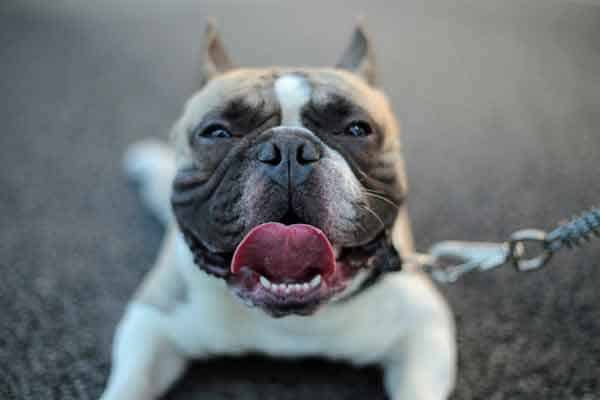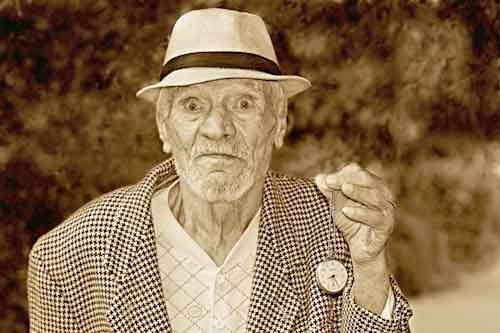Many dog owners mourn the fact that they will probably outlive their dogs. Dogs live shorter lives than humans and it’s just inevitable.
Why do dogs live short lives? We don’t know for sure. One of the best theories is that dogs have been cross-bred many times by humans over history. Nature tends to select the strongest breed but humans have often chosen the prettiest or biggest breeds over the more resilient breeds.
But there are many other theories.
Let’s take a look at some of the other theories because they are also quite interesting. We will also take a look at which dog treats live longer and why smaller dogs tend to live a long life than bigger dogs.
Table of Contents
Let’s dive into the most common answers to why dogs live a short life when compared to humans.
Theories About Why Dogs Live Short Lives
This is something that has baffled scientists and dog owners for ages.
They have been bred by humans (not nature)
As mentioned above, one theory is that our domesticated dogs have been cross-bred many times. Nature didn’t do this election for them. Humans did.
Nature, as we know, has a tendency to select the strongest breed over the weaker breed. But the dogs we have today are mostly bred according to what humans think is appropriate for work tasks or what we think is looking cute.
A good example here is the English bulldogs. Really cute fellas, but in fact, they aren’t even able to breathe naturally without making snoring sounds!
Not the best conditions for living as long as possible.
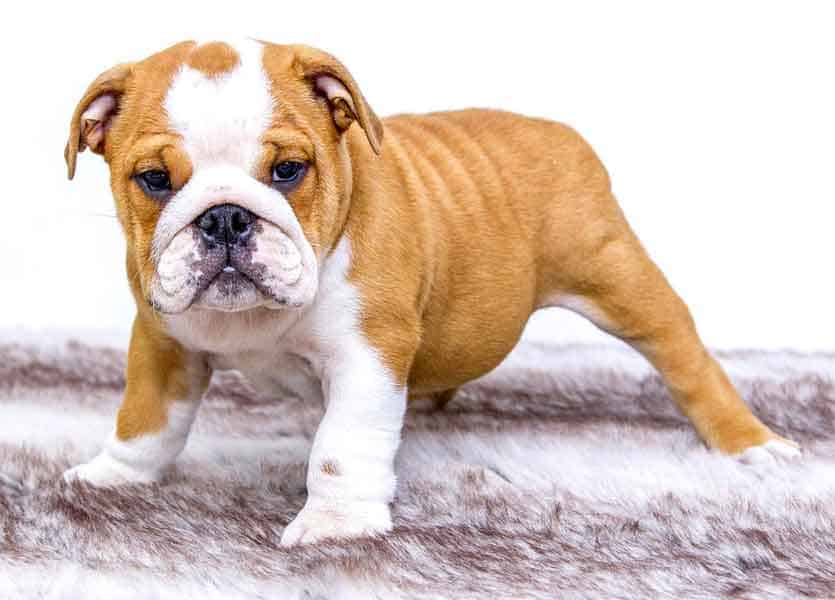
People have typically favored looks over strength and when we wanted to breed strong dogs we often just judge them by the looks. Nature tends to naturally select the strongest genes and make sure that the race gets stronger and stronger over time.
So by choosing cuteness over the life span and ability to survive, we may have been part of the reason why dogs do not live as long as their ancestors: wolves.
(We will come back to that later)
This could be part of the answer to why dogs didn’t evolve naturally to live longer and longer.
Cross-breeding has become illegal
Another theory is that dog breeder has a tendency to favor “pure breeds” over mixed breeds.
Prices have gone up and up for “pure dog breeds” where you are absolutely sure they are not mixed with any other breed. People will go to great lengths to make sure their dog is a pure breed champion!
This level of selective breeding is not good for making sure we have the best gene pool.
In nature, dogs would naturally cross-breed over and over again and we would have newer and (probably) stronger breeds over time.
Too much vaccination and bad food
Other scientists argue that the reason why dogs live shorter lives should be found in the way we use the medicine.
Veterinarians are using vaccines on dogs and other pets which causes them to survive even though they may not be strong animals. That means we have weak dogs and pets mixed into our breeds. Maybe the puppy would have better genes if its parents we the strongest they could be.
But vaccination is one of the primary income sources for veterinarians so it would be very hard to decrease the number.
Sad, but true.
Dog food is not what it used to be.
Back in the good old days, dogs would eat whatever was leftover from the meal. That would be crops and other good stuff from local farm production.
Today we feed our pets pre-fabricated pet food with GMO ingredients. They are often pumped with unnatural elements because the rules regarding pet food are less strict than the rules we have for our own food. And our own food is not that good, to begin with!
So if you want to prolong the life of your pet and give it the best possible conditions for long life you should avoid pre-fabricated pet food.
Evolution tends to favor bigger creatures
Another theory is in relation to the size of dogs. Because dogs are smaller than humans they also live shorter lives.
Let’s take an elephant for example. The elephant doesn’t have many natural enemies and therefore it lives a very long life. The same goes for the Blue Whale, Giant Tortoise, and a lot of older bigger, and huge animals.
So because they don’t have many natural enemies (or any at all) the “evolutionary pressure” is lower and they give favored by nature.
But if you ask me this is a pretty silly argument. But nonetheless, it is a theory and we do not know for sure why dogs do not live as long as humans or other bigger mammals.
How long do dogs live?
So, how long do dogs live? That varies a lot from breed to breed. The life expectancy varies from 7- 18 years generally speaking.
Here’s a list of breeds and the expected lifetime:
- Beagle: 13 years
- Scottish Terrier: 12 years
- Chihuahua: 15 years
- Border Collie: 13 years
- Chow Chow: 9 years
- French Bulldog: 9 years
- Great Dane: 7 years
- Mastiff: 7 years
- English Springer Spaniel: 12 years
- Miniature Dachshund: 14 years
As you can see from the list the Miniature Dachshund is one of the dog breeds with the longest lifespan. They tend to live up to 14 years in general.
A random breed with lots of different dog genes will typically live around 13 years.
So if you have no ideas what breed your dog is or if you are pretty sure it is mixed up big time, 13 years is the time you should expect.
How old is the oldest dog in the world?
According to the Guinness Book Of World Records, the oldest dog that ever lived was Bluey from Australia.
It reached an impressive age of 29 years and 5 months!
It died on November 14th in 1939 so it’s an old record. It worked among cattle and sheep for almost 20 years and that’s pretty impressive. Because the Australian Cattle Dogs are not among the smallest dog breeds as you can see here:
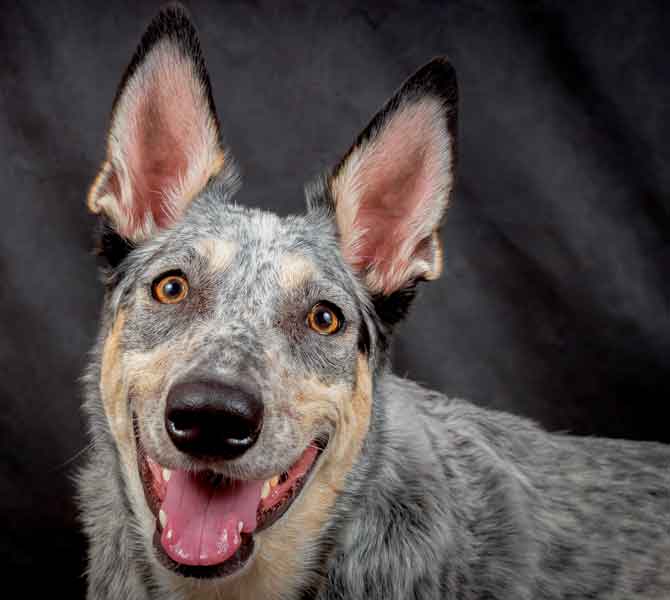
But still, that’s nothing compared to humans. We generally live for around 71 years. We have written an article here about why humans live longer than animals.
Dogs may have lived long ages ago
Dogs evolved from wolves and wolves live almost twice as long as dogs when you take their size into consideration.
As we will look at below, bigger dogs tend to live shorter lives than smaller dogs.
Wolves live up to 20 years in the wild and a dog the size of a Wolf would normally only live around 10 years!
There’s a good chance that dogs used to live a lot longer than they do today. At least if they would half the lifespan of their ancestors: The Wolves.
(we will get back to the Wolves in a second..)
Why Do Smaller Dogs Have a Shorter Lifespan?
Yes, it is true.
Smaller dogs have a longer lifespan.
The smaller the dog, the longer they tend to live. So your Golden Retriever will not get as old as your Chihuahua.
But Why is this so? Let’s take a look at the facts.
It is actually pretty weird because normally bigger mammals live longer than smaller mammals. This is true for a lot of animals but among dog breeds, it seems to be the opposite.
Even though there are exceptions to this rule.
Let’s take parrots, for instance. Some of the Macaws can get up to 80 years of age. And they are pretty small compared to your Labrador!
The reason small dogs have a shorter life span is still unknown but let’s take a look at some of the theories around this.
- One theory is that bigger dogs are more prone to get age-related illnesses.
There’s no good explanation for this theory, however, so it’s just pushing the question forward. Because why would bigger dogs be more prone to get age-related illnesses? - Larger dogs grow faster to reach a bigger size
This is another theory. Because larger dogs have to grow faster in order to get bigger they might be more likely to develop tumors and abnormal cell behavior. This could cause them to die prematurely from cancer. - My own theory is that smaller dogs have smaller bodies and therefore they have less body mass to be exposed to danger like radiation (over time) or even roadkill etc. This could cause them to live longer but probably not TWICE as much as bigger dogs.
I guess we have to wait for more research to be done into this matter!
Scientists have found out that for every 4,4 pounds (2 kilograms) of body mass a dog’s life is reduced by a month.
This actually means that smaller dogs can live twice as long as huge dogs.
That’s definitely something to consider when you are choosing your next dog. If you want it for many years to come you should not choose one of the biggest breeds there is.
Which dog has the LONGEST lifespan?
As we looked at the top of the smaller dogs tend to live the longest life.
And it seems like the winner here is the Miniature Dachshund with an impressive lifespan of around 14 years. (man-years that is, in dog years that would be almost 108 years!).
It seems like the Miniature Dachshund really won the lottery. It has the longest lifespan among dog breeds and it is also unarguably one of the absolute cutest dogs.
Just look at those puppy eyes!
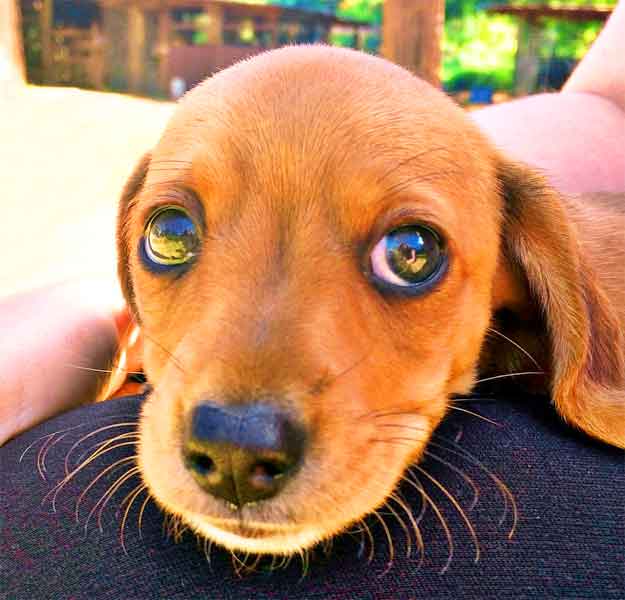
I especially love the long-haired Miniature Dachshund.
This is a puppy though. But even the fully grown Miniature Dachshunds looks almost like puppies because they are so tiny and cute!

My grandparents had these miniature dachshunds.
They had three of them after another and I never found out that it wasn’t actually the same dog. I thought this was a very special dog (and it was!) that could live for almost 30 years.
So I was a little sad when I found out that they had actually had three different dogs instead of one.
Which dogs have the SHORTEST lifespan?
We have to look among the biggest dog breeds to find the poor dog with the shortest lifespan.
At the bottom of the chart, we find the Bulldog. It will typically only live for around 6 years. That’s 48 years in dog years. That’s less than half the lifespan of the lucky Miniature Dachshund.
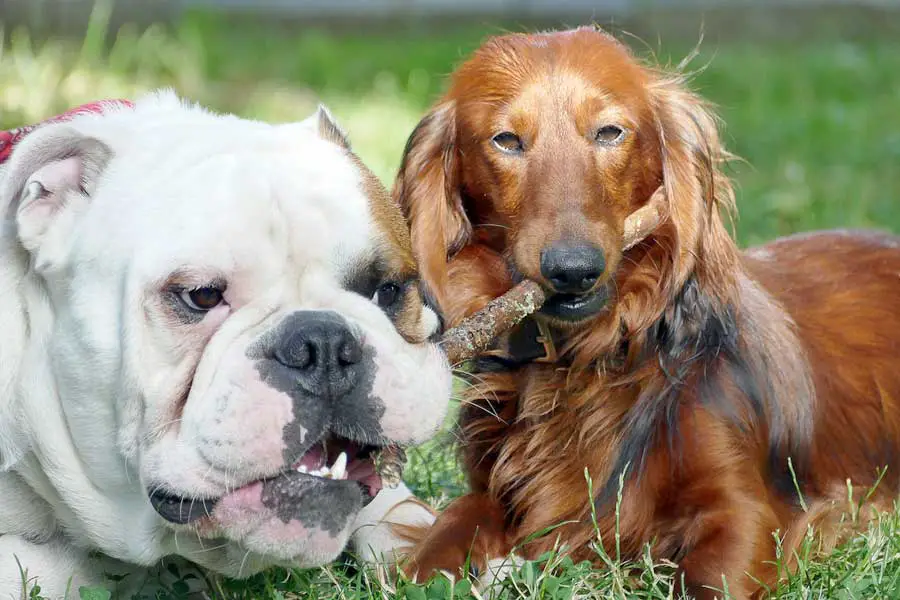
This Bulldog, however, doesn’t seem to have any problems with its short lifespan.
They are super-cute also and also part of the reason why they are so popular.

From what we found out about size and lifespan we would expect the dog with the shortest lifespan to be a really big dog.
That’s surprisingly enough we find the bulldog at the bottom of the list which is not one of the really big dogs.
The reason we find a Bulldog to have the shortest lifespan among the dog breeds is found in how the nose is constructed. The Bulldogs often have trouble breathing right. Especially the English Bulldog which is a perfect example of breeding gone wrong.
It’s bred for looks only.
Sources: akc.org, Guinness Book of World Records, Sciencemag.org



